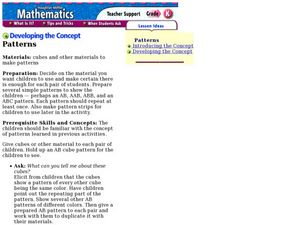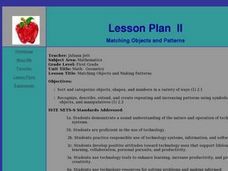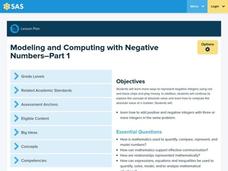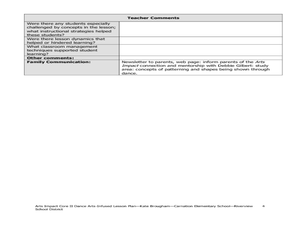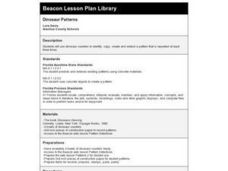Virginia Department of Education
Relationships Round Robin
Mathematics is all about patterns. Young mathematicians analyze geometric patterns to write algebraic expressions. They use the expressions to predict future stages of the patterns.
Curated OER
Investigation-How Many Toothpicks?
Seventh graders use toothpicks to investigate a series of designs and identify patterns. Data is organized and analyzed using tables and graphs, and students make generalizations using algebraic expressions.
Curated OER
Developing the Concept: Patterns
Students understand what a pattern is and how to make a pattern. In this pattern instructional activity, students use cubes to create various patterns. Students recognize the pattern created.
Curated OER
Pattern Makers
Students are introduced to the notion of a repeating pattern. This is done by a number of means including the use of everyday objects. They are encouraged to create, describe and continue patterns.
Curated OER
Leaf Patterns
First graders explore the existence of patterns in everyday items. In this science and math integrated lesson, 1st graders match leaves with a name word card and organize them into four patterns. This lesson includes a reading of And the...
Curated OER
Let's Explore Patterns
Second graders define the word pattern and other related vocabulary. They create a pattern independently. Students recognize and extend patterns. They explain how repeated patterns are made. Students explore several patterns on a...
Curated OER
Problem-Solving Strategy: Find a Pattern: Problem Solving
In this finding patterns instructional activity, students use the problem solving strategy of understand, plan, solve, and look back to help them find the pattern in the swimming distances numbers. Students use the pattern to help them...
Curated OER
Continue the Pattern
First graders read a book about patterns and then practice reproducing patterns. In this pattern lesson plan, 1st graders continue patterns that are already established by using manipulatives.
Curated OER
Make Your Own Pattern
In this early childhood understanding patterns worksheet, students find the pattern in 3 problems and then show each another way. Students also explain how they decided what pattern to make in 1 of the problems.
Noyce Foundation
Between the Lines
Explore linear and square dimensions by comparing areas of similar figures. A creative set of five activities designed for elementary through high school classes asks young scholars to compare areas of specific polygons. The first two...
Curated OER
Matching Objects and Patterns
First graders participate in hands-on activities and use objects to create patterns. They observe a PowerPoint lesson describing matching objects and patterns. In groups, 1st graders complete geometry computer activities such as planting...
Curated OER
Making Patterns
Pupils utilize skittles and unifix cubes to practice the recognition and creation of a variety of patterns. The created patterns are copied onto sheets and the colors are labeled.
Curated OER
Shapes and Patterns in Art and Oceans
First graders draw, cut out, and design their own fish shapes by cutting out shapes and putting them together. In this shapes and patterns worksheet, 1st graders also construct a stamp and print patterns with stamps to repeat a...
Curated OER
Beyond the AB Pattern in Dance
Students demonstrate various patterns using dance. In this expressive arts lesson, students are led in a warm-up to demonstrate the AAB pattern, which includes spinning and jumping. Students are broken up into groups and perform several...
Curated OER
Dividing with Fractions
Use paper strips or models to relate division problems to division of fraction problems. Since the materials can be broken up, it helps them to show how they can complete repeated subtraction with fractions and not just whole numbers.
Curated OER
Dancing Polygons and Non-Polygons with Patterns
Second graders study movements. In this dance lesson plan, 2nd graders draw patterns selecting one to represent through movement with their body.
Illustrative Mathematics
Complex number patterns
Start off with the definition of the imaginary number i, then have your class practice simplifying expressions involving powers of i and look for patterns. See how the cyclic nature of powers of i translate to sums of powers of i.
Curated OER
Talking About Your Name in Math Terms
Add imagination and creativity to your math lesson. Young mathematicians investigate ways to express their names in mathematical terms. For instance, they can count the number of letters, analyze the geometric shapes of the letters, or...
Curated OER
It Just Keeps Going and Going...
Students explore patterns, identify patterns, and complete a variety of patterns. They view and discuss an online video and identify the different patterns from the film, then using a hundreds grid create an original pattern using their...
Curated OER
Family Quilts Keep us Warm
Students explore families and culture. For this family and culture lesson, students discuss their families and their similarities and differences. Students read the book The Keeping Quilt by Patricia Polacco and create their own quilt...
EngageNY
Numbers in Exponential Form Raised to a Power
Develop an understanding of the properties of exponents through this series of activities. This third lesson of 15 explores the patterns associated with the power property. Scholars expand the powers before applying the property.
Curated OER
Learning about the World of Color, Object and Shape Patterns
First graders practice identifying and creating patterns by using unifix cubes. In this visual design lesson, 1st graders investigate reoccurring patterns using colors and shapes and extend what is being made with their unifix cubes....
Curated OER
Repeating Patterns
Students explore growth patterns by using manipulatives such as pattern blocks, investigate growth pattern of pattern, record growth in T-chart, describe how pattern is growing, and predict number of blocks needed to extend pattern.
Curated OER
Dinosaur Patterns
Students listen to story Dinosaurs Dancing, use dinosaur counters to identify, copy, create and extend pattern that is repeated at least three times, and complete web lesson plan.




